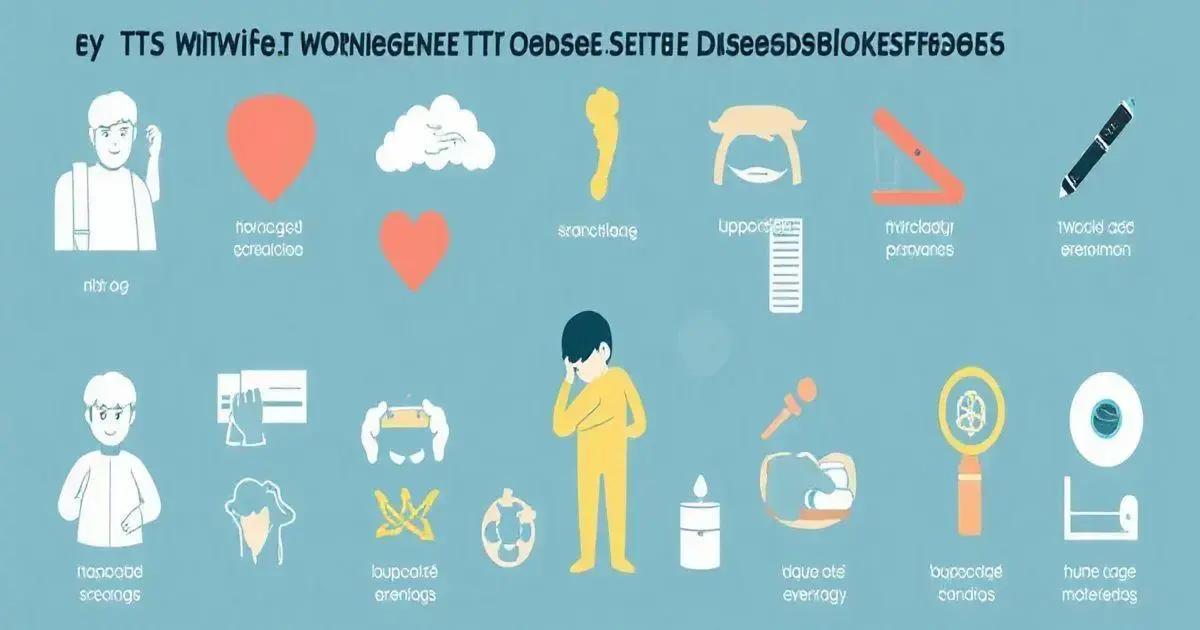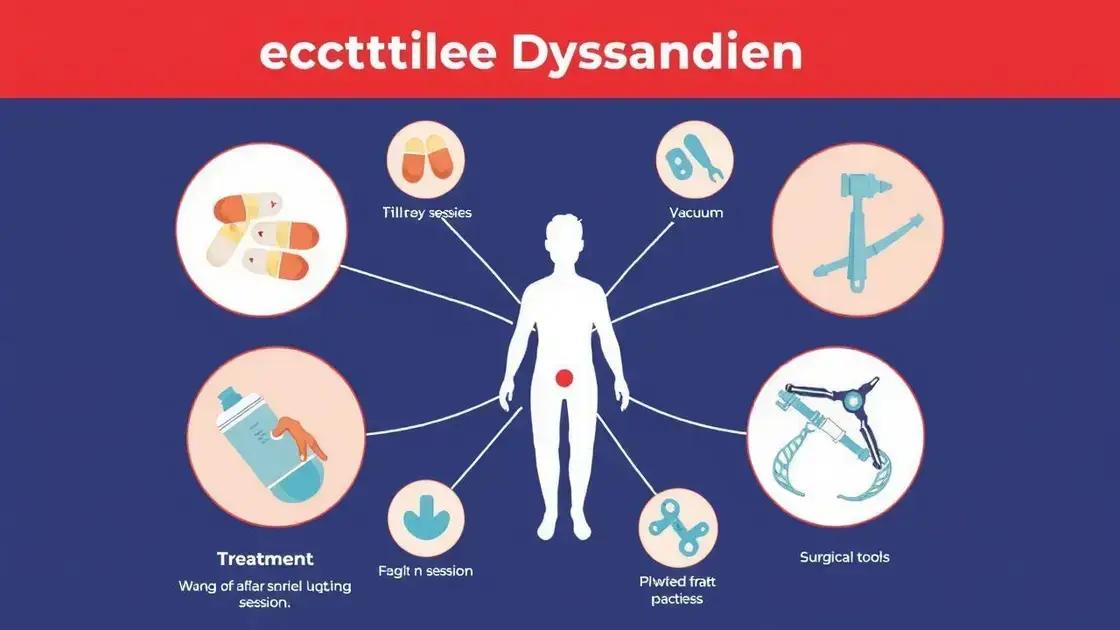Erectile dysfunction is a common issue for many men, especially as they age, and can be caused by physical and psychological factors. Treatment options include medications, therapy, and lifestyle changes, while maintaining open communication with partners and utilizing available resources can greatly improve sexual health and well-being.
Erectile dysfunction and aging are issues many face as they grow older. This condition affects millions, leading to feelings of frustration and anxiety. Understanding the connection between aging and erectile dysfunction can empower individuals to seek help. In this post, we explore the nature of this issue, debunk myths, examine treatment options, and provide tips for maintaining sexual health as one ages. Knowledge is the first step toward managing this common problem.
The Connection Between Aging and Sexual Health

The connection between aging and sexual health is an important topic that affects many individuals. As people age, their bodies undergo various changes that can impact their sexual function. Hormonal changes play a significant role in this process. For men, testosterone levels tend to decline with age, which can lead to erectile dysfunction and decreased libido.
Physical Health Factors
Additionally, age-related health issues such as diabetes, heart disease, and obesity can also contribute to sexual health problems. These conditions can affect blood flow, nerve function, and overall stamina. Therefore, maintaining a healthy lifestyle at any age is crucial for supporting sexual health.
Psychological Factors
Aging can also have psychological effects that influence sexual well-being. Feelings of anxiety about performance, concerns related to self-esteem, or fear of rejection can lead to decreased desire. It is vital to address these feelings, as a positive mindset can enhance sexual experiences.
Communication with Partners
Open communication with partners can bridge the gap caused by these changes. Discussing feelings and concerns can alleviate some anxiety and strengthen intimacy. It is essential for partners to support each other through this journey, fostering a healthy environment for sexual exploration.
Common Myths About Erectile Dysfunction

There are several common myths about erectile dysfunction that can create confusion and misinformation. Understanding these myths can help individuals address their concerns adequately.
Myth 1: Erectile Dysfunction is Normal with Aging
Many believe that erectile dysfunction is simply a normal part of aging. While the risk does increase with age, it is not an inevitable outcome. Many older men maintain a healthy sex life, and various treatments are available to help those who experience difficulties.
Myth 2: It Only Affects Older Men
Another misconception is that erectile dysfunction only impacts older men. However, younger men can also experience this condition due to factors like stress, anxiety, and lifestyle choices such as alcohol use and lack of exercise.
Myth 3: It’s All in Your Head
While psychological factors do play a role, erectile dysfunction can also have physical causes. Health issues such as diabetes, high blood pressure, or hormonal imbalances can trigger erectile dysfunction. It’s essential to consider both psychological and physiological factors.
Myth 4: You Can Only Treat It with Medication
Many believe that medications like Viagra are the only solution for erectile dysfunction. In reality, there are various treatments available, including therapy, lifestyle changes, and alternative therapies. Consulting a healthcare provider can help identify the best approach.
Myth 5: Talking About It Will Make It Worse
Some may think discussing erectile dysfunction with partners will cause embarrassment and worsen the situation. In actuality, open communication can build trust and understanding. It can also lead to better solutions and support from loved ones.
Understanding Treatment Options

Understanding treatment options for erectile dysfunction is crucial for anyone facing this condition. There are several approaches depending on the underlying cause.
Oral Medications
One of the most common treatments is the use of oral medications such as Viagra, Cialis, and Levitra. These medications work by increasing blood flow to the penis. Typically, they are taken about an hour before sexual activity.
Therapy
Counseling or therapy can be beneficial, especially when emotional or psychological issues contribute to erectile dysfunction. Therapy involves talking with a professional who can address anxiety, depression, or relationship problems.
Vacuum Devices
Vacuum erection devices (VEDs) are another option. These devices create a vacuum around the penis, drawing blood into it to achieve an erection. A constriction band is then placed at the base of the penis to maintain the erection.
Pills and Injections
Some individuals may prefer injections directly into the penis. This method can create an erection quickly. Another option is a urethral suppository, which can also deliver medication directly into the penis.
Surgery
For severe cases, surgery may be an option. Procedures can include penile implants, which allow men to achieve an erection when desired. This is usually considered when other treatments are ineffective.
Tips for Maintaining Sexual Health

Maintaining sexual health is essential for a fulfilling life. Here are several tips that can help you keep your sexual health in check.
Stay Active
Regular exercise is vital. Physical activity enhances blood flow, improves stamina, and can help maintain a healthy weight. Aim for at least 150 minutes of moderate exercise each week.
Eat a Balanced Diet
A nutritious, balanced diet rich in fruits, vegetables, whole grains, and lean proteins supports overall health. Foods rich in antioxidants and omega-3 fatty acids can improve circulation and boost libido.
Avoid Smoking and Limit Alcohol
Smoking can damage blood vessels and restrict blood flow, leading to erectile dysfunction. Additionally, excessive alcohol consumption can interfere with sexual performance. Limiting these habits can have a positive impact on sexual health.
Manage Stress
Stress can greatly affect sexual desire and performance. Engaging in relaxation techniques such as yoga, meditation, or deep breathing exercises can help alleviate anxiety and boost sexual health.
Regular Health Check-ups
Routine check-ups with your healthcare provider are essential. Regular visits help monitor conditions like diabetes and heart health, which can affect sexual function. Staying informed about your health can aid in early detection and treatment.
Resources for Support and Information

There are various resources for support and information available for individuals dealing with erectile dysfunction. These resources can provide valuable assistance and guidance.
Healthcare Providers
Your first step should be to consult with a healthcare provider. Doctors can offer professional advice, recommend treatment options, and help manage underlying health issues that may contribute to erectile dysfunction.
Support Groups
Joining a support group can be beneficial for emotional support. Group members often share experiences and coping strategies. Websites such as HealthUnlocked or local health organizations can help find support groups in your area.
Educational Websites
Several trusted educational websites provide comprehensive information about erectile dysfunction. Examples include the Mayo Clinic, WebMD, and the American Urological Association. These sites cover causes, symptoms, and treatment options effectively.
Books and Materials
Many books focus on sexual health and erectile dysfunction. Libraries or bookstores often have helpful titles that provide insights and treatment suggestions. Look for books written by qualified healthcare professionals.
Online Forums and Communities
Online platforms like Reddit or PatientsLikeMe offer forums where individuals can discuss their experiences and gather information from others facing similar challenges. These communities can be valuable for sharing personal stories and learning from others.
Understanding Erectile Dysfunction and Aging
Erectile dysfunction is a common issue that many men face, particularly as they age. By understanding the connection between aging and sexual health, men can navigate the changes that come with age more effectively.
Acknowledging the common myths surrounding erectile dysfunction helps clarify misconceptions and encourages open discussions about the condition. With various treatment options available, including medications, therapy, and lifestyle changes, individuals have many avenues to explore for improvement.
Maintaining sexual health is essential, and adopting a healthy lifestyle through exercise, balanced nutrition, stress management, and regular check-ups can significantly enhance sexual well-being.
Finally, leveraging resources for support and information is crucial. Whether it is consulting healthcare providers, participating in support groups, or utilizing educational websites, the right resources can provide valuable guidance for navigating erectile dysfunction.
In conclusion, awareness, communication, and proactive measures are key to managing erectile dysfunction as one ages, ultimately leading to a healthier and more satisfying sexual life.
FAQ – Frequently Asked Questions about Erectile Dysfunction and Aging
What is erectile dysfunction?
Erectile dysfunction is the inability to get or maintain an erection sufficient for satisfactory sexual performance.
Is erectile dysfunction common among older men?
Yes, while erectile dysfunction can occur at any age, it becomes more common in older men due to various physical and psychological factors.
What are the main causes of erectile dysfunction?
Erectile dysfunction can be caused by physical conditions like diabetes, heart disease, and obesity, as well as psychological issues such as stress and anxiety.
What treatments are available for erectile dysfunction?
Treatments for erectile dysfunction include oral medications, therapy, vacuum devices, injections, and in some cases, surgery.
How can lifestyle changes help with erectile dysfunction?
Adopting a healthier lifestyle by exercising regularly, eating a balanced diet, and managing stress can improve overall sexual health and reduce symptoms of erectile dysfunction.
Are there resources available for support and information?
Yes, many resources are available, including healthcare providers, support groups, educational websites, and books focused on sexual health.












